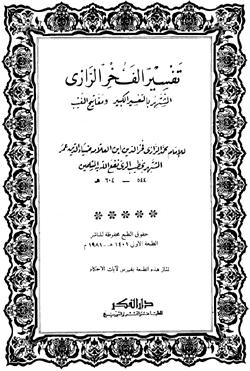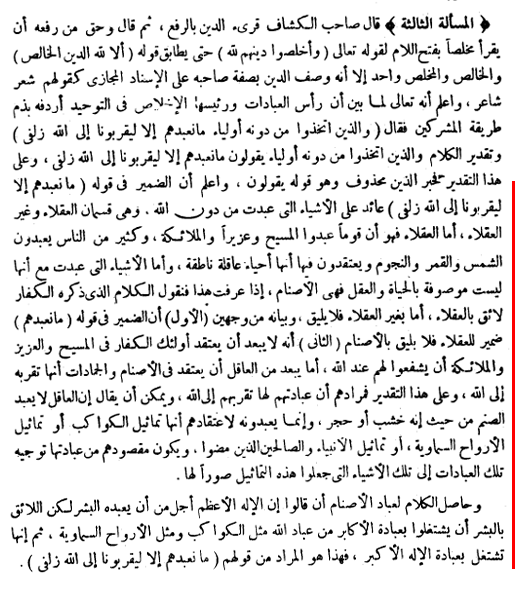| Friday, 11 July 2025 Home • About Us • Contact Us |
 | |
|
|
|
You are here:
Home /
Topics
/
Shafaa'ah
Mail to a Friend • Printer friendly 
Background and Introduction
Historically, the innovations of the first century were light innovations (Khawarij, Shi'ah, Qadariyyah, Murji'ah), in that they did not directly relate to Allaah Himself. Those that came in the second century hijrah were more severe in that they related directly to the belief in Allaah Himself (His Names, Attributes, His Uluww, His Speech), and then from this period the introduction of philosophy and gnosticism (mystical esoteric knowledge) led to further deviations. However, it took around six centuries for shirk (associationism) to spread amongst the Muslims on a wide scale. The seeds of this shirk were spread initially by the Ismaa'eelee Baatiniyyah known as Ikhwan al-Safaa (Brethren of Purity) in the third and fourth centuries, and they were given support by the Ubaidiyyah (Shii'ite rulers of Egypt) when they took power. Prior to this time (before the fifth century, i.e. 400H), whilst the variuos sects had deviations in issues of aqidah, the understanding of Tawhid al-Ibaadah was still relatively firm.
This shows that the greater deviations occurred when the people were further away from the era of revelation, and this is simply a cycle of history. This has always occurred after the sending of Prophets and Messengers, and it is indicated in the Prophetic texts for this ummah, such as those texts that mention that this (Muslim) nation will follow the footsteps of those (nations) that came before them (such as the Jews and Christians). For this reason, the greatest deviation, shirk with Allaah, was the last of the affairs to enter into the Ummah - long after the era of Prophethood.
Coming to the subject of this series of articles now, we present in this some quotations from the Tafseer of ar-Razi pertaining to the core arguments for the justification of supplicating to those besides Allaah and seeking their intercession, and through this we illustrate that this type of refutation against the grave and saint worshippers precedes Ibn Taymiyyah (rahimahullaah) by a century and Ibn Abdul-Wahhaab (rahimahullaah) by six centuries, and it also uncovers the academic and intellectual fraud of today's grave and saint-worshippers against the Scholars of Tawheed.
Fakhr ud-Din ar-Razi on Seeking the Prophets and Righteous as intermediaries for Nearness to Allaah
In the (first part) of this series (see here), it was established that ar-Razi showed rejection against those who venerate the graves, seeking to win the intercession of the righteous dead, and he stated that this is rebutted by the Qur'an. Here is his statement quoted previously, and it is in reference to the saying of Allaah, "And they worship besides Allah things that hurt them not, nor profit them, and they say: "These are our intercessors with Allah"." which is in Surah Yunus (10:18), he wrote:
ونظيره في هذا الزمان اشتغال كثير من الخلق بتعظيم قبور الأكابر على اعتقاد أنهم إذا عظموا قبورهم فانهم يكونون شفعاء لهم عند الله
Please refer to (Part 1) for the full context of the above quotation, because ar-Razi has stated that this action is equivalent to the practice of the idolators. In this article we want to now take a look at his commentary on another verse in the Qur'an which contains a mention or the argument used by the pagans to justify their worship (invocation, supplication) to other than Allaah, be they animate, or inanimate. The verse in question is this one:
 أَلَا لِلَّهِ الدِّينُ الْخَالِصُ وَالَّذِينَ اتَّخَذُوا مِن دُونِهِ أَوْلِيَاء مَا نَعْبُدُهُمْ إِلَّا لِيُقَرِّبُونَا إِلَى اللَّهِ زُلْفَى إِنَّ اللَّهَ يَحْكُمُ بَيْنَهُمْ فِي مَا هُمْ فِيهِ يَخْتَلِفُونَ إِنَّ اللَّهَ لَا يَهْدِي مَنْ هُوَ كَاذِبٌ كَفَّارٌ أَلَا لِلَّهِ الدِّينُ الْخَالِصُ وَالَّذِينَ اتَّخَذُوا مِن دُونِهِ أَوْلِيَاء مَا نَعْبُدُهُمْ إِلَّا لِيُقَرِّبُونَا إِلَى اللَّهِ زُلْفَى إِنَّ اللَّهَ يَحْكُمُ بَيْنَهُمْ فِي مَا هُمْ فِيهِ يَخْتَلِفُونَ إِنَّ اللَّهَ لَا يَهْدِي مَنْ هُوَ كَاذِبٌ كَفَّارٌ 
Ar-Razi writes (Tafsir ar-Razi 26/241):
Now, if we did not state this was from Fakhr ud-Din ar-Razi you might be thinking that this was a passage from Shaykh ul-Islam Ibn Abdul-Wahhab's "Kashf ush-Shubuhaat" (Removal of the Doubts), or "al-Qawaa'id al-Arba'" (The Four Rules) or some of the other treatises of Ibn Abdul-Wahhaab (rahimahullaah). But no, its from a prominent Ash'arite figurehead who lived just into the beginnings of the seventh century hijrah, in a time when the Major shirk started to spread within the Ummah, and he spoke of it in a manner exactly like it is found in the works of Shaykh ul-Islam Ibn Taymiyyah a hundred years later and in the works of Shaykh ul-Islam Ibn Abdul-Wahhab six hundred years later. The only difference is that as it became more widespread, then it was spoken against more formally and books were dedicated to it. Now, remember you have understand these statements of ar-Razi in light of what he pointed out regarding what was taking place in his time:
ونظيره في هذا الزمان اشتغال كثير من الخلق بتعظيم قبور الأكابر على اعتقاد أنهم إذا عظموا قبورهم فانهم يكونون شفعاء لهم عند الله
And when you put all of this together, the feeble, weak and brittle house of the 20th century grave and saint-worshipper comes tumbling down. Shaykh ul-Islam Ibn Abdul-Wahhaab On This Subject We can quote from "Kashf ush-Shubuhaat" to compare with the speech of ar-Razi quoted above, now pay real good attention to this, and compare it well with what one of the greatest of Ash'arite figureheads was saying six centuries before Ibn Abdul-Wahhaab (rahimahullaah), so here is the quote from "Kashf ush-Shubuhaat":
فإن قال: الشرك عبادة الأصنام ونحن لا نعبد الأصنام فقل: ما معنى عبادة الأصنام؟ أتظن أنهم يعتقدون أن تلك الأخشاب والأحجار تخلق وترزق وتدبر أمر من دعاها؟ فهذا يكذبه القرآن، كما في قوله تعالى: قُلْ مَن يَرْزُقُكُم مِّنَ السَّمَاءِ وَالأَرْضِ [يونس:31] الآية. وإن قال هو من قصد خشبة أو حجراً أو بنية على قبر أو غيره يدعون ذلك ويذبحون له ويقولون، إنه يقربنا إلى الله زلفى ويدفع عنا ببركته ويعطينا ببركته. فقل صدقت، وهذا فعلكم عند الأحجار والبنايات التي على القبور وغيرها، فهذا أقر أن فعلهم هذا هو عبادة الأصنام، وهو المطلوب ويقال له أيضاً قولك: "الشرك عبادة الأصنام"، هل مرادك أن الشرك مخصوص بهذا، وأن الاعتماد على الصالحين ودعاءهم لا يدخل في هذا؟ فهذا يرده ما ذكر الله في كتابه من كفر من تعلق على الملائكة أو عيسى أو الصالحين فلا بد أن يقر لك أن من أشرك في عبادة الله أحداً من الصالحين فهو الشرك المذكور في القرآن وهذا هو المطلوب
So with this, the truth is now firmly established and the falsehood has been demolished, and the academic and intellectual fraud of today's gnostics and the grave and saint-worshippers donning the gown of piety, has been exposed. What you have just read is the essence of "Kashf ush-Shubuhaat", right there in the writings of a sixth century (hijrah) prominent Ash'arite figurehead.
Link to this article: Show: HTML Link • Full Link • Short Link Related Articles:
You must be registered and logged in to comment. |
|
|
© TawhidFirst.Com. All rights reserved.
|
 To the right is a cover page for the book "Tafsir ar-Razi", also known as "Mafaateeh al-Ghayb" belonging to
To the right is a cover page for the book "Tafsir ar-Razi", also known as "Mafaateeh al-Ghayb" belonging to  And the equivalent of this in our time is the occupation of many of the creation with the veneration of the graves of the senior [righteous] ones, upon the belief that when they venerate their graves, then they (the deceased) will become intercessors for them with Allaah.
And the equivalent of this in our time is the occupation of many of the creation with the veneration of the graves of the senior [righteous] ones, upon the belief that when they venerate their graves, then they (the deceased) will become intercessors for them with Allaah.